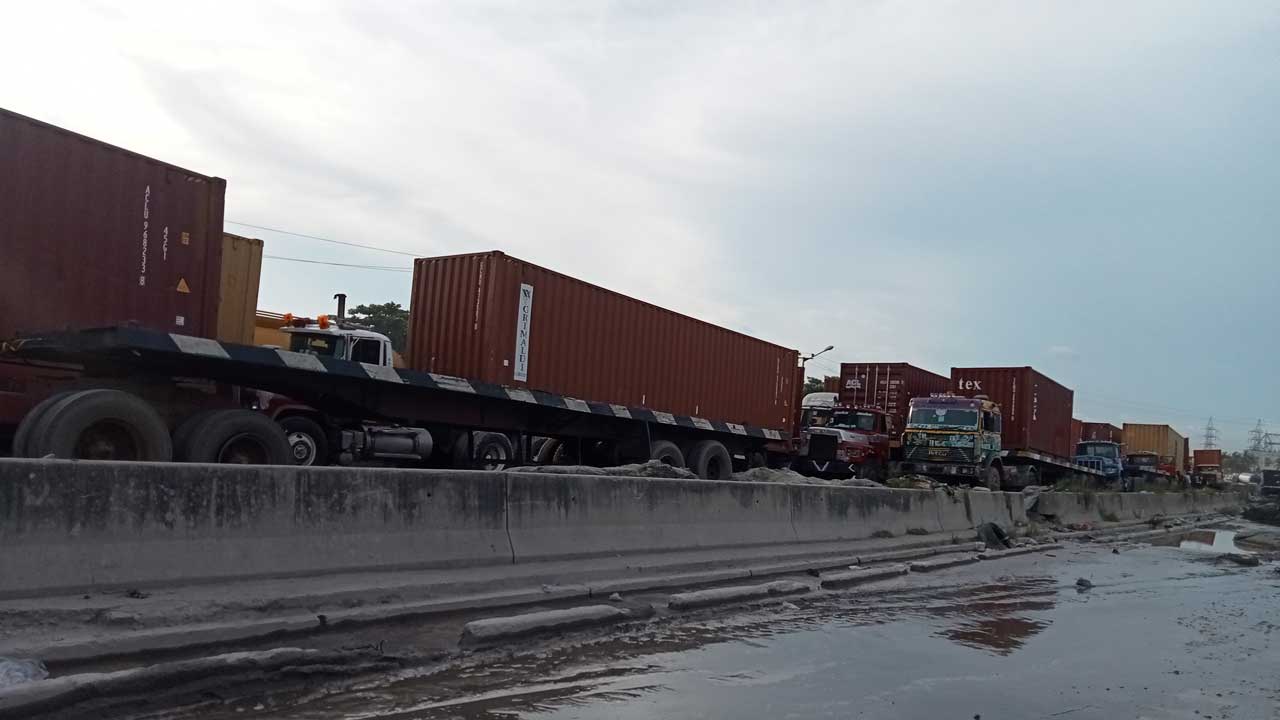
The Federal Government has been tasked to seek alternative solutions to the unending perennial gridlock at the Lagos ports corridors, which according to the organised private sector, costs the economy about N2 trillion loss yearly.
Ports users have complained about the burden of extreme congestion at the ports, which had taken a huge toll on businesses along the ports corridors as terminal operators, manufacturers and importers have lost several man-hours and investments, despite efforts by the government to fix the problems.
Barely a month after the Federal Government said traffic at Apapa port corridor has reduced by 80 per cent, over 200 container trucks and petroleum products tanker have occupied Mile 2 road to Tin Can Island port, with no road for the popular mode of transportation (Okada) around the ports.
The truck drivers, when asked why they were static on the road, expressed anger at being delayed despite having the Eto tickets to access the ports, as they pay N1, 000 to the union taskforce each day they spend on the road.
A truck driver, Abiodun Yaya, expressed disappointment at the electronic system, noting that he had spent one week in the traffic just to access the Tin Can port to drop an empty container, despite having his Eto ticket.
Another truck driver, Lawal Oladeji said the management of the Eto system has delayed truck drivers from accessing the port due to the slow response in processing the codes on the tickets.
He said trucks are being turned back on several occasions, due to the inability to process the Eto tickets on time, while groaning that he spends N1, 000 everyday he spends on the road.
Meanwhile, stakeholders, during a Town Hall meeting put together by JournalNG in Lagos, themed: “Towards Hitch Free Port Operations In Nigeria,” urged the Federal Government to explore other alternatives to reduce the Lagos ports congestion to the barest minimum.
President General of the Maritime Workers Union of Nigeria (MWUN), Adewale Adeyanju, noted that a lot should be done by deploying long term measures to ensure that the corridors experience free flow of traffic to the terminals, jetties and ports.
Adeyanju, who was represented by the Deputy President-General of the Union, Boniface Udoh, said there is need for alternative means to convey cargoes.
He noted that barging activities would aid trade facilitation and create seamless flow of cargo clearance and movement to and from the ports.
According to him, barging activities can provide succor for the existing gridlock despite the ongoing road construction along the Apapa Oshodi expressway, noting that barge operations should be perceived as a tool of conveyance of cargoes and freeing the roads for other users.
“As a responsible social partner, we have called on the governments and its regulatory agencies to take urgent action and undertake any means to cause a reduction in the traffic on our port access roads,” he said.
Adeyanju disclosed that studies by the MWUN on the main cause of the persistent gridlock showed that shipping firms should be held responsible for lack of holding bays, parking lots and empty containers stacking.
He said the lack of holding bays is in absolute disregard for regulations and standards.
On the e-call up system, Adeyanju commended the Nigerian Ports Authority (NPA) for its innovativeness in managing the system, but stressed the need for the construction of more holding bays for trucks in Ijora and Tin Can Island ports.
The union boss also enjoined the Federal Government to relocate petroleum product tank farms to Epe, Ikorodu and other less populated areas as a tool to further decongest the seaports and its environs.
On his part, the Port General Manager, Kaduna Inland Dry Port Limited, Rotimi Hassan, said activities in Apapa and Tincan ports have been an issue of concern to maritime business stakeholders in the country.
He said the gridlock has created many challenges to the business community ranging from increased haulage cost and accrued demurrage, alongside associated costs.
Hassan said these challenges have affected revenue generation to federal, state governments and stakeholders/business associates.
Hassan said to have a seamless port operation in the country, the Federal Government must construct long-lasting road infrastructure and sustainable rail system for easy transportation of cargoes to create conducive logistics planning at a given period.
He also charged the Nigerian Railway Corporation to expedite action on the provision of more wagons and locomotives to improve the evacuation of cargoes from the seaports to other Inland dry ports across the country.



